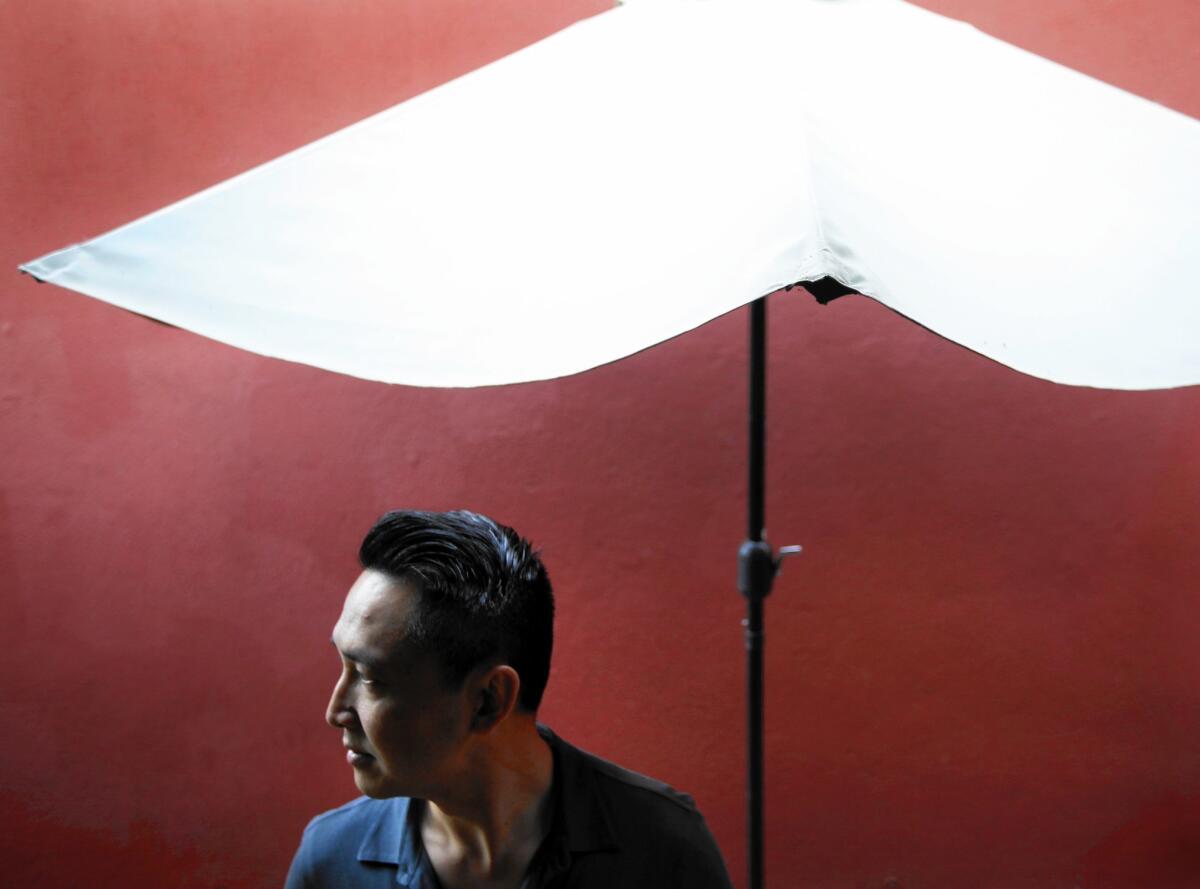Viet Thanh Nguyen tackles Vietnam War’s aftermath in ‘The Sympathizer’

Much of Viet Thanh Nguyen’s debut novel, “The Sympathizer” (Grove: 371 pp., $26), takes place in the bland stucco flatlands of Los Angeles between the fall of Saigon in 1975 and the staging and aftermath of a failed counterrevolution by members of the displaced anti-communist Vietnamese diaspora several years later. The unnamed narrator is a mole sent to America with the vanquished South Vietnamese to keep tabs on their actions and potential threat to the communist regime in Vietnam.
“The Sympathizer” reads as part literary historical fiction, part espionage thriller and part satire. American perceptions of Asians serve as some of the book’s most deliciously tart commentary, as in a scene where the narrator negotiates the price of a payoff check with an American entertainment lawyer after he is injured in an explosion on the set of a Vietnam War film (winkingly modeled on “Apocalypse Now”) in the Philippines:
“Five thousand dollars is wonderful if I thought only of myself, but an Asian — here I paused and allowed a faraway look to come into my eyes, the better to give them time to imagine the vast genealogical banyan tree extending above me, overshadowing me with the oppressive weight of generations come to root on my head — an Asian can not think just about himself.”
FULL COVERAGE: FESTIVAL OF BOOKS
Nguyen knows of what he writes. His family, which ran a number of successful businesses in South Vietnam, fled to America in 1975 when Nguyen was 4 and their town fell to communist troops. They landed at a refugee camp in Pennsylvania, and Nguyen was briefly separated from his parents when a white family sponsored him.
“They wanted me to feel at home, so they got me chopsticks and asked me to teach them how to use them,” recalls Nguyen, sitting in a plush armchair in the living room of his Silver Lake home, which he shares with his wife and 21-month-old son, Ellison (named for Ralph Ellison). “I didn’t know how to use chopsticks, and I felt very bad. That was my first encounter with my otherness in America, and it just got worse from there.”
Nguyen was raised in San Jose — before the application of Silicon Valley’s expensive gloss — where his parents opened one of the city’s first Vietnamese stores. They worked so much, he says, that he hardly saw them, but it paid off in true immigrant success story fashion: His older brother went to Harvard and Nguyen to Berkeley. Nguyen is an associate professor of English and American studies and ethnicity at USC and has been teaching at the university for more than a decade.
INTERACTIVE GAME: HOW TO BE A WRITER
His parents were as ardently anti-communist as they were pro-Catholic. Instead of being raised with stories of the boogeyman, Nguyen was told that he was lucky not to be back in his homeland, fighting in a war with Cambodia. He was also raised on — or rather raised himself on — a steady diet of American books and films, many of which were about the Vietnam War. Films like “Platoon” and “Apocalypse Now” scarred him and convinced him that Americans were more interested in how their enemies viewed the war than their allies, many of whom lived in their own backyard.
“Many Vietnamese refugees feel the Americans betrayed them by pulling out, but they would never say it publicly in English,” says Nguyen. “Because the Vietnamese people are grateful to America for rescuing them, and they don’t want to contaminate that narrative. But I’m willing to because it’s what is said in private, and Americans need to hear this complexity.”
This complexity is at the heart of “The Sympathizer,” in which Nguyen set out to tell a compassionate story from the point of view of a person who, even though he took a side, could see the point of view of the other side. In many ways, says Nguyen, that’s the worst possible position. It’s the position of Hamlet.
“You have a much happier life if you just see things from one point of view. You have no ambiguity,” he says. “We’re all tempted by this belief that we’re right and terrible things happen as a result of that. It’s not just other people who are guilty of this, we ourselves are guilty of it, and we need to recognize it because this conviction of our rightness justifies our use of power, whether it’s petty political power in academic situations or real militarized violence with horrifying consequences.”
Nguyen will appear at the Festival of Books on April 18.
More to Read
Sign up for our Book Club newsletter
Get the latest news, events and more from the Los Angeles Times Book Club, and help us get L.A. reading and talking.
You may occasionally receive promotional content from the Los Angeles Times.








